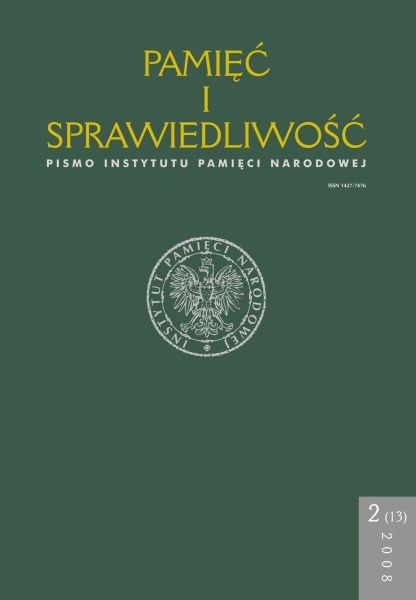Szpital totalnie produkcyjny. Polski szpital położniczy na przełomie lat osiemdziesiątych i dziewięćdziesiątych XX wieku
Pamięć i Sprawiedliwość, V. 13 N. 2 (2008), pages: 211-228
Publication date: 2008-12-30
Abstract
This article is dedicated to the functioning of maternity hospitals in the final period of real socialism. The hospital or maternity ward does not fi t into the general definition of hospital, among other reasons because the women admitted are overwhelmingly healthy. Therefore clinics of this type should fundamentally differ from other health care institutions that care for sick persons requiring medical care and complicated pharmacological or surgical treatment.
Depending on the letters of women who were patients in maternity wards in the 1980s the author concludes that these particular health care institutions not only functioned according to the same regulations as other hospitals but even according to similar principles as production enterprises. Simultaneously, she demonstrate that, due to the form of organization and methods of work caused by the
contemporary decision-makers of maternity clinics, they were in principle close to the concept of total institutions, formulated by Erving Goffman. In her work the author poses the question whether in the daily functioning of a maternity hospital these principles were refl ected, while the vision of a communist model brought it to the functioning level of the work place in which the woman is the raw material and the child the product.
Analyzing in subsequent sections of the article mandatory hospital procedures, referring to the way in which women in labor were admitted, birth or possibility of contacting the outside world (child’s father), the author proves that they sought to fulfill the demands of socialist industry where a person was merely a cog in the machine. The attitude of the personnel, both doctors and midwives, confi rms the belief that the maternity hospital was a de-humanized institution in which the woman was treated like an object serving to produce new citizens. However, not
always and not everywhere. Characteristic of the functioning of hospitals was the ‘porosity’ between prescribed procedures toward women and the reigning freedom of behavior of the personnel. In this situation, the author concludes that maternity hospitals in the late 1980s and early 1990s were a specifi c kind of total institution, rather far removed from the principles guiding models in communist Poland reminiscent of an ideal factory.
 Język Polski
Język Polski
 English
English
 Deutsch
Deutsch
 Français (France)
Français (France)
 Italiano
Italiano
 Русский
Русский


 PDF (Język Polski)
PDF (Język Polski)
